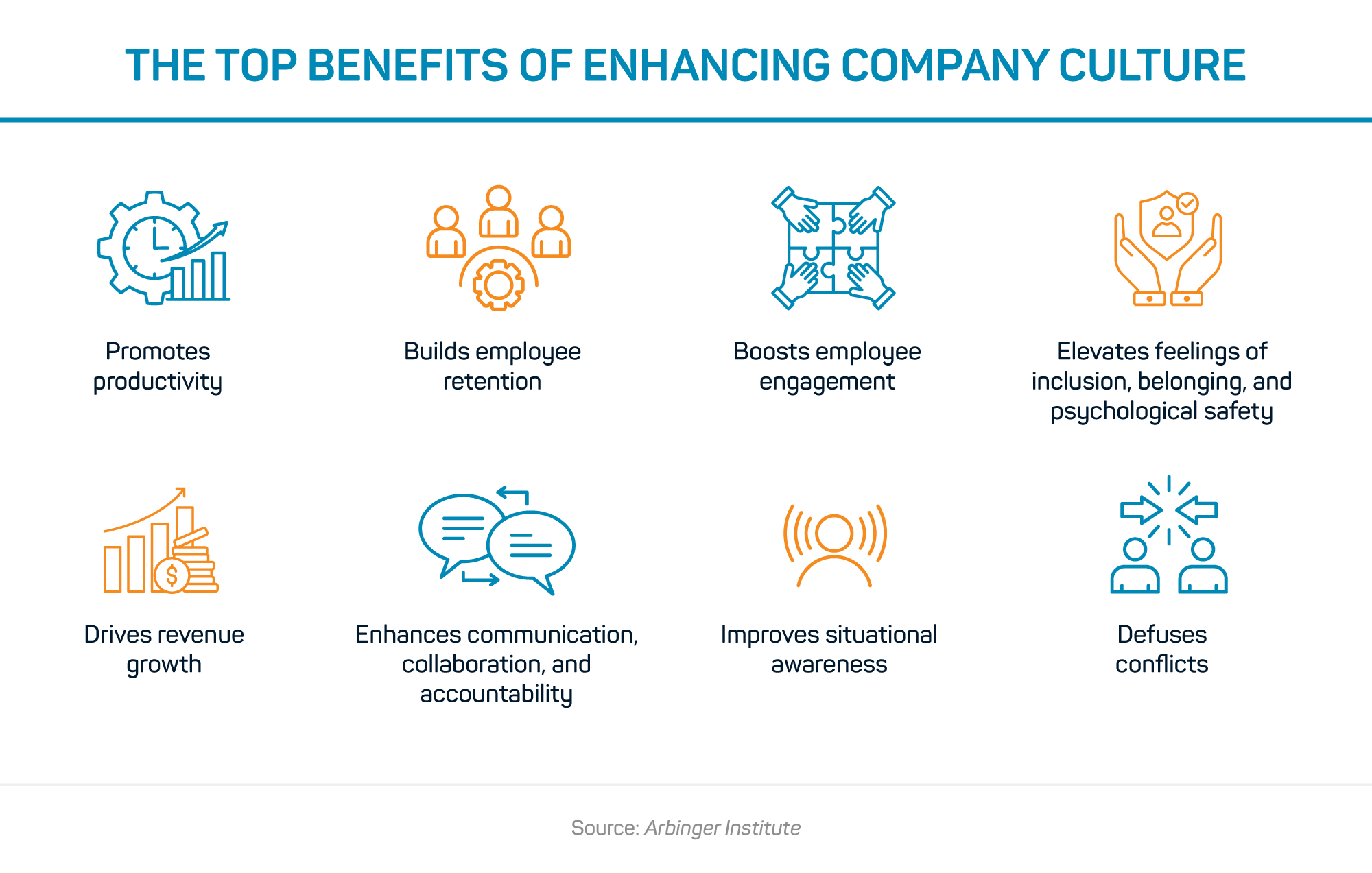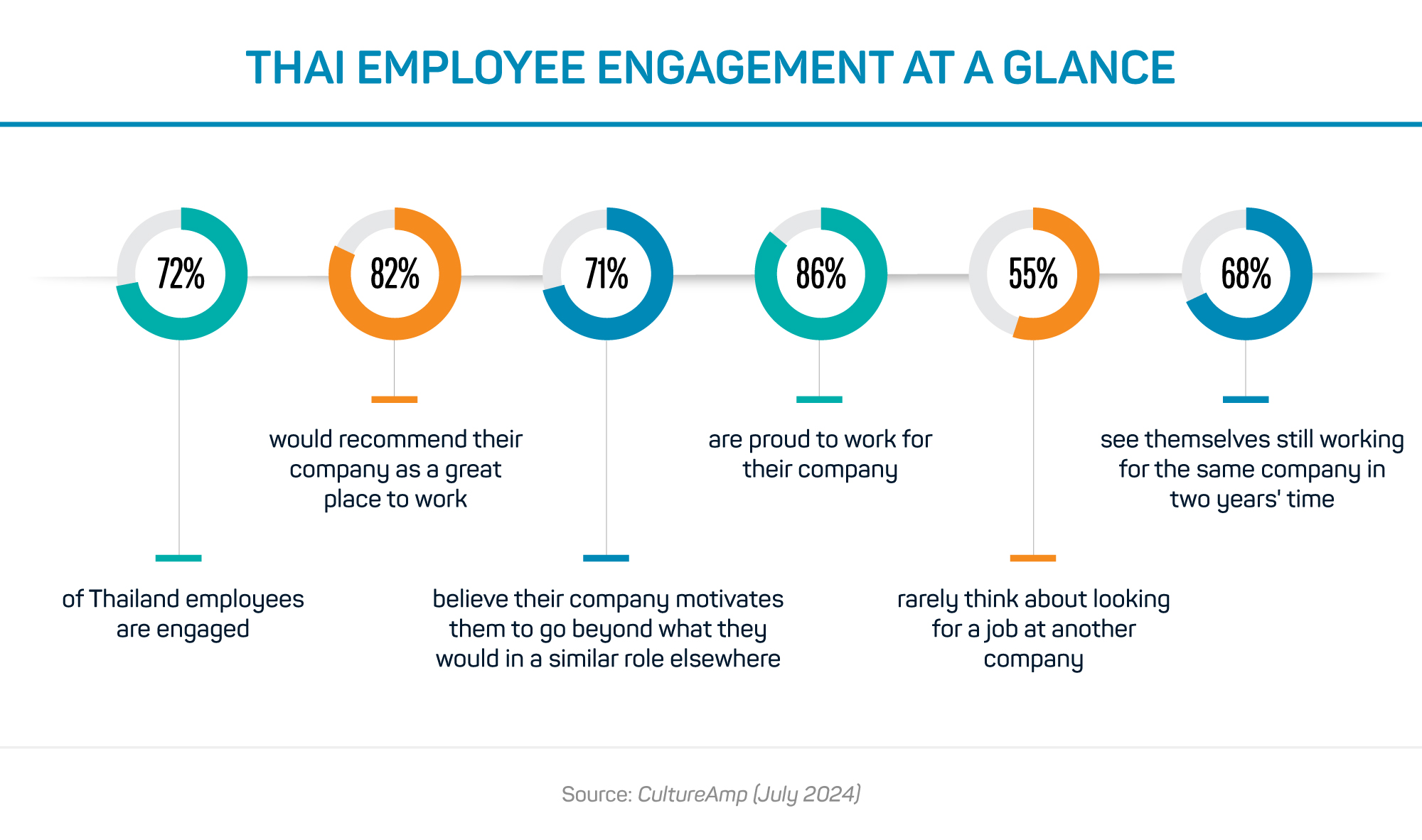
Top 10 Tips for Building a Better Company Culture in Thailand
Why is company culture a critical aspect that employers need to focus on? This isn’t just about offering office perks like free pizza or Casual Fridays, although that’s just a sliver of the whole pie. The essence of company culture encompasses the collective values, norms, and behaviours of an organisation. It’s what influences every employee in the company – from rank and file to C-suite level – and it’s reflected on how they perform, react, and interact.
Research conducted by Culture Amp, the world’s leading employee experience platform, reported interesting insights about Thai employees’ engagement within their local company culture.
The study also revealed that Thai respondents received particularly positive ratings in the areas of Feedback and Recognition, Action, and Innovation. However, they scored below-average ratings in Company Performance, Voice, and Work and Life Blend.
Strengthening and maintaining company culture in the Thai workplace can have a positive impact on employee satisfaction and overall organisational success. Employers in Thailand can benefit from these best practices to create a thriving company culture for their workforce.
1. Define your core values
It all starts with values, the cornerstone of your company culture. Your organisation’s mission and vision should be aligned to your company’s values. This will be the guiding compass of every employee to ensure that they contribute to a consistent, purpose-driven work environment.
Take time with your management team to decide the kind of values that will be the basis of your company’s mission and vision. Share these ideas with the rest of the team. Collective decision-making is a key aspect in Thai culture. It’s important to get their feedback and buy-in, so that everyone is responsible for upholding and embodying these values at work.
2. Cascade your company culture clearly
Every employee, regardless of their role and level, should understand and embrace your company culture. That’s why it’s essential to communicate these values clearly and consistently. Make sure there’s a section on company culture in your employee handbook and company website. Dedicate time to discuss this during onboarding of new hires, recognise employees who have exemplified your company values, and highlight culture-focused activities and programs in your company communications.
3. Practise what you preach
Respect for hierarchy is deeply ingrained in Thai culture. Employees look up to their managers to set the example for them to follow. As a business leader, it’s important to “walk the talk.” You have the responsibility to model the values and behaviours you wish to see in your team, so they’ll feel guided and supported.
4. Include cultural fitness in candidate qualifications
Whilst skills and experience are necessary in evaluating candidates, assessing their cultural fitness will provide insights into whether they can thrive within your company culture. This will also foster long-term retention of high-quality talent in your organisation. During the job interview, ask the candidate how they would handle specific challenges to evaluate their decision-making process and cultural alignment.
5. Provide opportunities for development
According to research by Culture Amp, 54% of employees are more likely to stay with a company that invests in their progress. Offering training and development initiatives is a proven strategy to boost employee engagement and retention. Provide learning programs that enrich their professional and personal growth. This also gives you a continuous pipeline of skilled internal talent that can fill other roles within your organisation.
6. Recognise employee achievements
Recognising and rewarding employees for their accomplishments is a powerful way to increase morale and inspire sustained high performance. There should be equitable opportunities for everyone to participate in recognition programs, ensuring fairness and encouraging consistent contributions across the team.
7. Respect work-life balance
Right to Disconnect laws have been enacted in Western countries such as Australia, Italy, Belgium, Spain, Portugal, Ireland, and France. Whilst it remains to be seen if it’s applicable in Thailand as a law, it does open the discussion further on respecting the employees’ time after work or during their personal time-off. Be proactive in respecting boundaries by nurturing an environment that encourages a healthy work-life balance. Set clear expectations for communication beyond office hours. Lead by example. Managers should respect their staff’s personal time to promote a culture of well-being.
8. Foster diversity and inclusivity
Implementing diversity and inclusivity initiatives in the workplace introduces fresh perspectives that drive innovation for your business. Studies have proven the positive effects of welcoming a diverse workforce:
- 35% higher chance of surpassing the competition
- 70% more likely to tap into new markets
- 87% more effective in decision-making
- 19% increase in revenue
9. Create a safe space for open communication
Poor communication that lacks transparency and respect can quickly turn a workplace toxic, increasing the likelihood of conflicts. Employees must be able to respectfully express their feedback without fear of reprisal. Establishing clear communication channels, implementing anonymous feedback tools, conducting conflict resolution and team-building exercises, and offering leadership training on communication can help build trust and foster a healthier workplace dynamic.
10. Trust your employees
Sanuk is a core aspect of Thai culture, reflecting the belief that one should find joy and fulfillment in any task whilst staying productive. Nurture this in the workplace by trusting your staff to perform their tasks. Guide them, but don’t micromanage them. Empowering your team to work independently fosters creativity and a sense of ownership, ultimately leading to a more motivated and joyful workforce.
ASW Consulting: Your Guide to Fostering a Thriving Company Culture
Establishing and exemplifying a strong company culture rooted in core values can have lasting benefits in terms of employee engagement, workforce well-being, and even revenue growth.
Explore more insights on workforce management and employment opportunities with ASW Consulting. Our team of experienced talent consultants is driven by our core values of Respect, Accountability, Success, and Growth to support your company in achieving sustainable growth. For more information about our services, contact us today.
Related blogs:
Respect and Hierarchy: Navigating Thai Workplace Relationships
Building a Culture of “Sanuk”: Tips for Creating a Happy & Engaged Thai Team
Extra Benefits for Thai Employees Beyond the Standard Package





